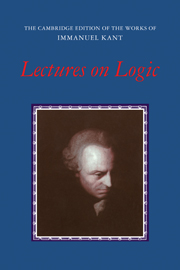Book contents
- Frontmatter
- Contents
- General editors' preface
- Acknowledgments
- Translator's introduction
- PART I The Blomberg logic
- Introduction to the doctrine of reason according to the thoughts of Professor Kant
- Introduction to the doctrine of reason according to the Author
- The doctrine of reason itself: The first principal part
- The doctrine of reason itself: The second principal part
- The doctrine of reason itself: The third principal part
- The doctrine of reason itself: The fourth principal part
- PART II
- PART III The Dohna-Wundlacken logic
- PART IV The Jäsche logic
- PART V Appendixes
- Explanatory notes
- Name index
- Subject index
The doctrine of reason itself: The second principal part
Published online by Cambridge University Press: 05 June 2012
- Frontmatter
- Contents
- General editors' preface
- Acknowledgments
- Translator's introduction
- PART I The Blomberg logic
- Introduction to the doctrine of reason according to the thoughts of Professor Kant
- Introduction to the doctrine of reason according to the Author
- The doctrine of reason itself: The first principal part
- The doctrine of reason itself: The second principal part
- The doctrine of reason itself: The third principal part
- The doctrine of reason itself: The fourth principal part
- PART II
- PART III The Dohna-Wundlacken logic
- PART IV The Jäsche logic
- PART V Appendixes
- Explanatory notes
- Name index
- Subject index
Summary
Method is nothing other than the form of a whole of cognitions, insofar as it is arranged according to the rules of logical perfection. Now because logical perfection is of two kinds, however, namely, either logical perfection according to healthy reason or logical perfection according to learnedness and science, method will be able to be divided in the same way. For the rules of healthy reason are distinct from the rules of science. In all sciences and learnedness the method of healthy reason must reign, to be sure, but everything that occurs in learnedness need not also, conversely, occur in healthy reason. In all sciences I look not to how something appears in employment, but instead to how it can be judged before any employment. I look to how something can be thought in abstracto, too[;] but if, on the contrary, I proceed according to the rules of healthy reason, then I must show everything in concreto. The second kind is a cognition that brings with it a certain life. The first, however, serves only for speculation and curiosity. Now the methods of the learned are various:
1. quoad objectum. I.e., as to the matter that they comprehend under themselves, or on which they are erected. For the object can be either
A. historical cognition, or
B. rational cognition. The latter includes, e.g., mathematics, and philosophy, the former geography and the proper history of history.
[…]
- Type
- Chapter
- Information
- Lectures on Logic , pp. 235 - 238Publisher: Cambridge University PressPrint publication year: 1992



